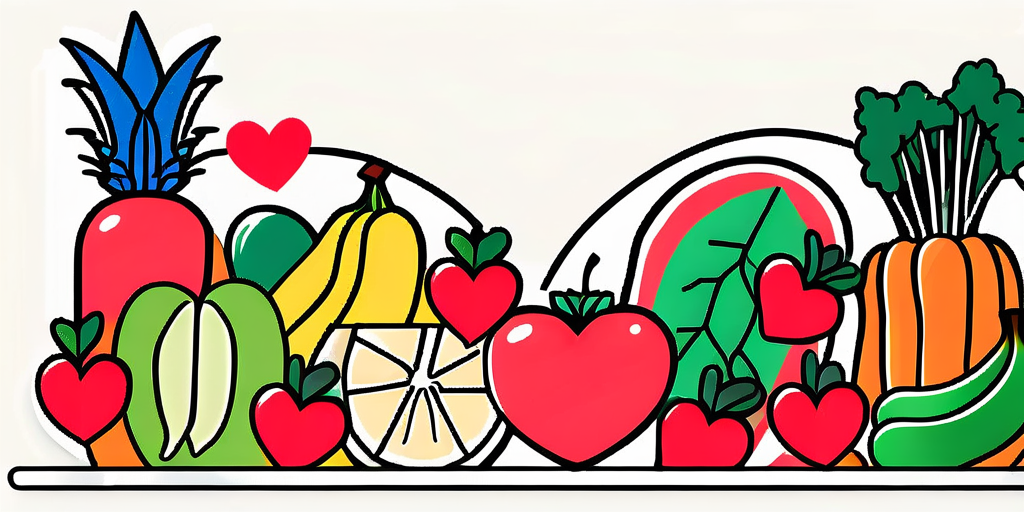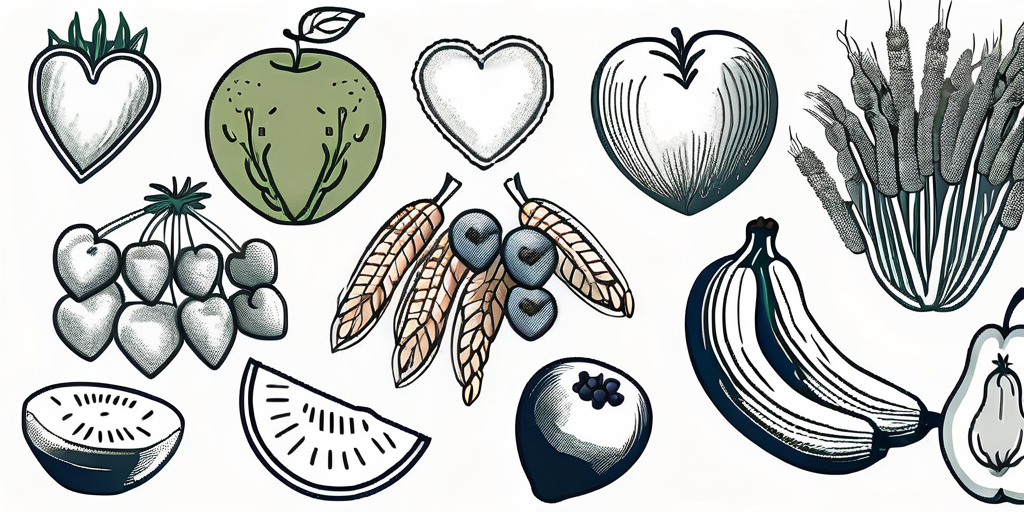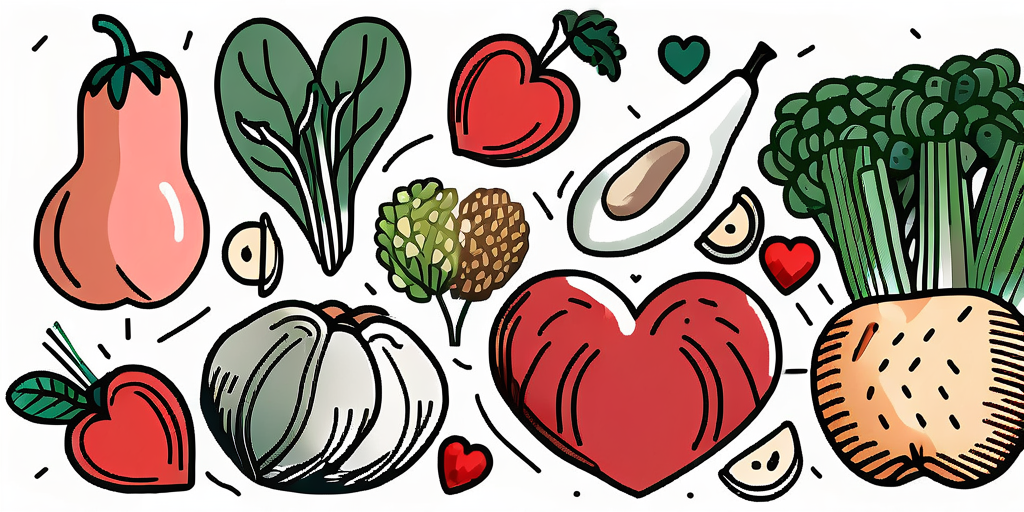Heart disease is a leading cause of death worldwide, but the good news is that making simple changes to your diet can significantly reduce your risk. By incorporating heart-healthy foods into your daily meals, you can boost your cardiovascular health and promote overall well-being. In this article, we will explore the top 10 heart-healthy foods that you should include in your diet to support a healthy heart.
Understanding the Importance of Heart Healthy Foods
Before we dive into the specifics, let's take a moment to understand why heart-healthy foods are crucial for our well-being. The heart is a vital organ that works tirelessly to pump blood and oxygen throughout the body. By providing essential nutrients, heart-healthy foods help support the functioning of this vital organ and prevent the development of heart disease.

When it comes to maintaining a healthy heart, diet plays a significant role. Research has shown that the foods we consume have a profound impact on our heart health. A diet high in saturated fats, cholesterol, and sodium can increase the risk of developing heart disease. On the other hand, a diet rich in fruits, vegetables, whole grains, and lean proteins can help prevent heart-related issues.
The Role of Diet in Heart Health
Our dietary choices have a direct impact on the health of our heart. Consuming heart-healthy foods can significantly reduce the risk of developing cardiovascular diseases. These foods not only provide essential nutrients but also help maintain healthy cholesterol levels, blood pressure, and weight.
Fruits and vegetables, for example, are packed with vitamins, minerals, and antioxidants that protect the heart by reducing inflammation and oxidative stress. Whole grains, such as oats and brown rice, are rich in fiber, which aids in maintaining healthy cholesterol levels. Lean proteins, like skinless poultry and fish, provide essential amino acids without the added saturated fats found in red meats.
Nutrients Essential for a Healthy Heart
There are several nutrients that play a crucial role in maintaining a healthy heart:
- Omega-3 fatty acids: These essential fats are found in fatty fish like salmon, mackerel, and sardines. Omega-3 fatty acids help reduce inflammation, lower triglyceride levels, and decrease the risk of abnormal heart rhythms.
- Fiber: Found in abundance in fruits, vegetables, whole grains, and legumes, fiber aids in maintaining healthy cholesterol levels. It helps remove excess cholesterol from the body, preventing it from clogging the arteries and reducing the risk of heart disease.
- Antioxidants: These powerful compounds are found in colorful fruits and vegetables like berries, spinach, and tomatoes. Antioxidants protect the heart by combating oxidative stress, which can lead to the development of heart disease.
- Monounsaturated fats: Foods rich in monounsaturated fats, such as avocados, nuts, and olive oil, can improve cholesterol levels and reduce the risk of heart disease. These fats are considered heart-healthy because they help lower LDL (bad) cholesterol while increasing HDL (good) cholesterol.
- Plant sterols: Plant sterols are naturally occurring substances found in fruits, vegetables, nuts, and seeds. They have a similar structure to cholesterol and can help lower LDL cholesterol levels by blocking its absorption in the intestines.
By incorporating these nutrients into our diet, we can take proactive steps towards maintaining a healthy heart. Remember, a well-balanced diet that includes a variety of heart-healthy foods is key to promoting cardiovascular health and reducing the risk of heart disease.
The Top 10 Heart Healthy Foods
When it comes to maintaining a healthy heart, incorporating the right foods into your diet is essential. Not only can these foods provide a delicious and satisfying eating experience, but they also offer a wide range of benefits for your cardiovascular system. Let's explore the top 10 heart-healthy foods in more detail:

The Benefits of Berries
Berries, such as strawberries, blueberries, and raspberries, are packed with antioxidants and fiber. These powerful compounds can help reduce inflammation, lower blood pressure, and improve overall heart health. Incorporating a variety of berries into your diet is an excellent way to satisfy your sweet tooth while supporting your cardiovascular system.
Furthermore, berries are also rich in vitamins and minerals, making them a great addition to any balanced diet. Whether you enjoy them fresh, frozen, or blended into a smoothie, these little fruits are a big win for your heart.
The Power of Whole Grains
Whole grains, such as oats, brown rice, and whole wheat bread, are rich in fiber and nutrients. They can help lower cholesterol levels and reduce the risk of heart disease. Opt for whole grain options whenever possible, whether it's choosing whole wheat pasta or enjoying a bowl of oatmeal for breakfast.
Additionally, whole grains provide a steady release of energy, keeping you feeling fuller for longer. This can help prevent overeating and support a healthy weight, which is another crucial aspect of heart health.
Why Leafy Green Vegetables are Essential
Leafy greens, such as spinach, kale, and Swiss chard, are nutritional powerhouses. Packed with vitamins, minerals, and antioxidants, these vegetables can help lower blood pressure and reduce the risk of heart disease. Add a handful of leafy greens to your salads, smoothies, or stir-fries to give your heart a boost.
Moreover, leafy greens are low in calories and high in fiber, making them an excellent choice for weight management. Their versatility in cooking also allows you to explore various delicious recipes while reaping the heart-healthy benefits.
The Importance of Healthy Fats in Fish
Fatty fish, such as salmon, mackerel, and sardines, are excellent sources of omega-3 fatty acids. These essential fats are known to reduce inflammation, lower triglyceride levels, and support heart health. Aim to include fish in your diet at least twice a week to reap these benefits.
Additionally, fish is a great source of high-quality protein, making it a nutritious choice for overall health. Grilling, baking, or steaming fish can help retain its natural flavors while keeping the calorie count low.
The Advantage of Avocados
Avocados are an excellent source of monounsaturated fats, which can help improve cholesterol levels and reduce the risk of heart disease. They are also rich in potassium, a mineral that plays a crucial role in regulating blood pressure. Enjoy avocados as a spread, slice them into salads, or simply eat them on their own for a heart-healthy snack.
Furthermore, avocados are incredibly versatile and can be used in a variety of dishes. From guacamole to avocado toast, these creamy fruits add a delicious and nutritious touch to any meal.
The Wonders of Walnuts
Walnuts are a tasty and convenient snack that is packed with heart-healthy nutrients. They contain omega-3 fatty acids, fiber, and antioxidants, all of which contribute to improved heart health. Sprinkle chopped walnuts onto your salads, add them to your morning bowl of yogurt, or enjoy them as a standalone snack.
In addition to their heart benefits, walnuts are also known to support brain health and improve cognitive function. So, next time you're looking for a quick and nutritious snack, reach for a handful of walnuts.
The Goodness of Garlic
Garlic is not only a flavorful ingredient but also a heart-protective one. It contains sulfur compounds that have been shown to help lower cholesterol levels and reduce blood pressure. Incorporate garlic into your cooking by roasting it with vegetables, adding it to sauces, or using it as a seasoning for your favorite dishes.
Moreover, garlic has been used for centuries for its medicinal properties. It is believed to have antimicrobial and immune-boosting effects, making it a valuable addition to your overall well-being.
The Value of Olive Oil
Olive oil is a staple of the Mediterranean diet, which has been linked to numerous health benefits, including improved heart health. Olive oil is rich in monounsaturated fats, antioxidants, and anti-inflammatory compounds, making it an excellent choice for cooking, salad dressings, and marinades.
Furthermore, the rich flavor of olive oil can enhance the taste of your dishes while providing a host of health benefits. Drizzle it over roasted vegetables, use it as a base for homemade salad dressings, or dip your bread in it for a heart-healthy treat.
The Significance of Seeds
Seeds, such as flaxseeds and chia seeds, are small but mighty when it comes to heart health. They are packed with omega-3 fatty acids, fiber, and antioxidants. Sprinkle seeds onto your oatmeal, yogurt, or salads for a nutrient boost that will benefit your heart.
Additionally, seeds are a great source of plant-based protein, making them an excellent choice for vegetarians and vegans. Whether you choose to grind them into a powder or consume them whole, these tiny powerhouses can make a big difference in your heart health.
The Magic of Dark Chocolate
Yes, you read that right! Dark chocolate, when consumed in moderation, can provide heart-protective benefits. Rich in antioxidants called flavonoids, dark chocolate may help lower blood pressure and improve blood flow. Look for dark chocolate with a high percentage of cocoa and enjoy a small piece as a treat.
Moreover, dark chocolate is known to boost mood and promote feelings of well-being. So, indulging in a square or two of this delectable treat can not only satisfy your sweet tooth but also contribute to a healthier heart.
Incorporating Heart Healthy Foods into Your Diet
When it comes to taking care of your heart, incorporating heart-healthy foods into your diet is crucial. These foods are not only delicious but also provide essential nutrients that can support your cardiovascular health. But how exactly can you ensure that you are getting enough of these foods? Let's explore some tips and strategies for incorporating heart-healthy foods into your daily routine.

Tips for a Balanced Diet
In addition to incorporating specific heart-healthy foods, it's important to maintain a balanced diet overall. This means aiming to include a variety of fruits, vegetables, whole grains, lean proteins, and healthy fats in your meals. These foods provide a wide range of nutrients that can support your heart health.
When it comes to fruits and vegetables, try to include a colorful assortment in your meals. Different colors indicate different nutrients, so by incorporating a variety of colors, you can ensure that you are getting a wide range of heart-healthy compounds. For example, red and orange fruits and vegetables are rich in antioxidants, while leafy greens provide essential vitamins and minerals.
Whole grains, such as brown rice, quinoa, and whole wheat bread, are excellent sources of fiber and other important nutrients. They can help lower cholesterol levels and reduce the risk of heart disease. Lean proteins, such as skinless poultry, fish, and legumes, are also important for a balanced diet. They provide essential amino acids and are lower in saturated fat compared to red meats.
When it comes to fats, it's important to choose healthy options. Incorporate sources of healthy fats, such as avocados, nuts, and olive oil, into your meals. These fats can help lower bad cholesterol levels and reduce inflammation in the body.
On the other hand, it's crucial to limit processed foods, sugary drinks, and excessive salt intake. These foods can contribute to high blood pressure, weight gain, and other risk factors for heart disease. By reducing your intake of these foods, you can further support your heart health.
Meal Planning for Heart Health
Meal planning can be a helpful tool in ensuring you incorporate heart-healthy foods into your daily routine. By planning your meals ahead of time, you can make sure that you have all the necessary ingredients on hand and avoid relying on unhealthy takeout or convenience foods.
Start by creating a shopping list based on the heart-healthy foods you want to incorporate. This list can include items like fresh fruits and vegetables, whole grains, lean proteins, and healthy fats. By having a well-thought-out list, you can make grocery shopping more efficient and avoid impulse purchases of unhealthy foods.
Once you have your ingredients, take the time to prepare nutritious meals at home whenever possible. Cooking at home allows you to have better control over the ingredients and cooking methods used. You can experiment with new recipes that feature the top 10 heart-healthy foods mentioned above to keep your meals exciting and flavorful.
Consider dedicating a specific day of the week to meal prep. This can involve chopping vegetables, cooking grains, and preparing proteins in advance. By doing this, you can save time during busy weekdays and ensure that you always have healthy options available.
Remember, incorporating heart-healthy foods into your diet is a lifelong commitment. It's not just a short-term fix but a long-term investment in your health. By making these simple dietary changes and prioritizing heart-healthy foods, you can take significant steps towards maintaining good cardiovascular health.
However, it's important to note that everyone's dietary needs are different. What works for one person may not work for another. It's always a good idea to speak with a healthcare professional or dietitian for personalized guidance and advice on incorporating these heart-healthy foods into your diet. They can help you create a plan that suits your individual needs and preferences.




